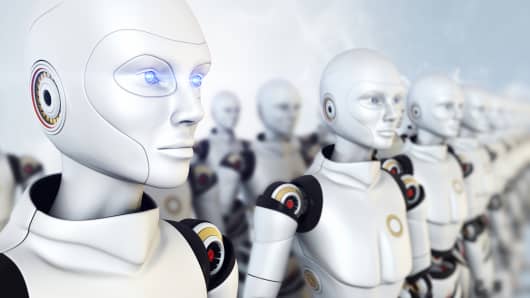While a private sector push for a UBI may seem surprising, the concept was never just a socialist fantasy. Conservative economists Friedrich Hayek and Milton Friedman believed some form of basic income was a more efficient way for the government to assist the economically disadvantaged. Richard Nixon, no one's idea of a left-wing liberal, was another conservative believer in the basic income.
Then Ronald Reagan came along, and everything changed.
In 1976 Reagan started making the "Cadillac Driving Welfare Queen" a standard part of his stump speech. Reagan's Welfare Queen was a vivid image painting everyone who received public assistance as a cheat and a fraud.
Like a lot of simple political slogans, it was effective. Like a lot of simple political slogans, the truth was more complex. And like a lot of simple political slogans, it had a lasting impact.
Ronald Reagan made the stereotype of the lazy recipient of government aid a fixture of mainstream conservatism.
That stereotype represents one of the biggest barriers to seriously considering how a basic income would work.
But it's time to move beyond that stereotype. We need to prepare for a future where there might not be enough jobs, and where people might need some form of basic income to make ends meet.
For that to happen, serious dialogue needs to occur between conservatives and liberals about the new automated economy, and how to create economic security without destroying the individual ambition and drive that makes us all better off. And it's hard to have a serious dialogue with people you disagree with after you've spent years hurling insults at each other.
I know from personal experience.
I'm a small business owner, and there are aspects of conservative economic policy that resonate with me. But though we were poor, my parents were politically aware—and they told my brother and me that Democrats were the party of people like us, people who needed a little help when things went wrong.
Growing up, I believed the difference between being wealthy and being poor was eating a grilled cheese made from Kraft Singles—like some of my "rich" friends did—rather than the block of government cheese my family used.
And growing up I knew exactly how Ronald Reagan spoke about people who got their cheese from the county, rather than the grocery store.
Before I get called a #snowflake that needs to toughen up, conservatives have complained a lot over the past year about liberals reflexively accusing them of racism, and they are right to complain.
It feels awful to be on the receiving end of a label you didn't earn. Unearned labels also create unbridgeable divides—and unbridgeable divides prevent the type of cooperation needed to address big challenges.
Viewing "Welfare Queens" (or immigrants, or the Chinese) as the cause of our economic problems in need of a simple solution like "Making America Great Again" does nothing to keep an employer from realizing it's cheaper to have a robot on the factory floor—or in the law office.
In politics, a simple story often wins.
But the future will not be simple, particularly if we live in a country where some workers have a job, and the rest of us have been replaced by machines. A Universal Basic Income might be one solution to bridge that gap.
Before we can seriously consider that idea, politicians need to start engaging in a dialogue about the future of work that's based on reality, rather than nostalgia-driven slogans and shallow stereotypes.
Commentary by Dustin McKissen, the founder and CEO of McKissen + Company, a strategy, marketing, and public relations firm based in St. Charles, Missouri. He was named one of LinkedIn's "Top Voices" in 2015 and 2016, and is currently pursuing a PhD in Organizational and Industrial Psychology. Follow him on Twitter @DMcKissen.
For more insight from CNBC contributors, follow @CNBCOpinion on Twitter.



